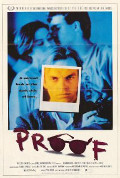
Directed by
Jocelyn Moorhouse
86 minutes
Rated M
Reviewed by
Bernard Hemingway

Proof (1991)
Written by Jocelyn Moorhouse and originally conceived as a 50 minute film, this her debut feature as a director was a critical success winning Best Film, Best Supporting Actor (Russell Crowe in his first significant screen appearance), Best Actor (Hugo Weaving), Best Editing (Ken Sallows), General Members' Prize for Excellence, Best Director, and Best Screenplay at the Australian Film Institute Awards as well as Outstanding First Feature at the British Film Institute Awards (1992) amongst other international awards. It also did quite well at the domestic box office, taking over $AU2m on its theatrical release alone.
Martin (Weaving) is a blind man looked after by a housekeeper, Celia (Genevieve Picot) with whom he has a hostile, sexually-repressed relationship. Distrustful of the world around him he takes photographs to verify the reality of what he believes to exist and gets Celia to describe their contents to him. When Martin meets Andy (Crowe) a kitchen-hand at a local restaurant the two strike up an unlikely but genuine friendship, but when Andy also hits it off with Celia, sexual tensions are brought to a head with Martin once again withdrawing into himself.
Although firmly at the arthouse end of the Australian film spectrum Proof is relatively unusual in having such a pronounced philosophical agenda that weaves the central psychosexual game-playing between Martin and Celia with questions of what we as humans can know to be true. Whilst this is commendably ambitious, at times, particularly in the second half, the dialogue becomes rather tortured, and laughably so as it tries to balance the mundanity of the narrative with its loftier concerns.
Weaving gives a compelling performance with solid support from Picot and Crowe and overall Proof is a well-made film that with its somewhat cynical portrayal of human relations has the credentials to appeal to a intellectual, literate audience.
FYI: Moorhouse subsequently went on to direct How To Make An American Quilt (1995) and A Thousand Acres (1997) and together with her producer on this, Linda House, produced Muriel's Wedding (1994) for her husband P.J. Hogan. Cinematographer Martin McGrath also did Muriel's Wedding and Children of the Revolution (1996) whilst Weaving and Crowe went to international careers although such was not the case for the female stars, Picot and Heather Mitchell.
Want something different?





